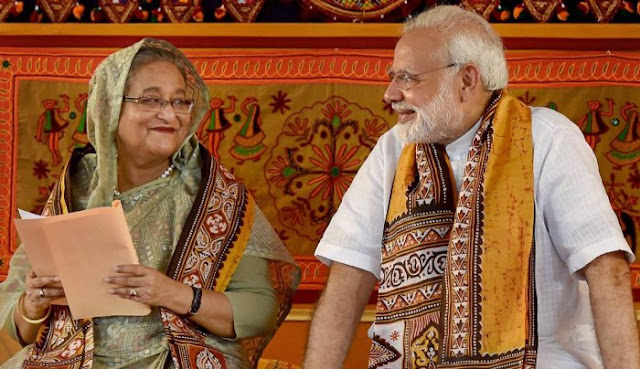
|
Bangladesh PM Shaikh Hasina with Indian Prime Minister Narendra Modi |
India's Influence in Bangladesh
By Riaz Haq
CA

Shaikh Hasina has won a fifth term in yet another sham election which saw a mere 40% voter turnout. Bangladesh Nationalist Party (BNP), the main opposition party, boycotted the election.
Months leading up to the elections saw protests in the country on account of economic slowdown, human rights violations, and a crackdown on the opposition parties. Her long stay in office is believed to be largely facilitated by India . Her own Foreign Minister Abdul Momen acknowledged this fact when he made a trip to New Delhi in 2022 and said, “I've requested the Modi government to do whatever is necessary to sustain Sheikh Hasina's government".
Upon her return from India in 2022, Sheikh Hasina told the news media in Dhaka, "They (India) have shown much sincerity and I have not returned empty handed". It has long been an open secret that Indian intelligence agency RAW helped install Shaikh Hasina as Prime Minister of Bangladesh, and her Awami League party relies on New Delhi's support to stay in power. Bangladesh Foreign Minister Abdul Momen has described India-Bangladesh as one between husband and wife. In an interview with Indian newspaper 'Ajkal,' he said, "Relation between both countries is very cordial. It's much like the relationship between husband and wife. Though some differences often arise, these are resolved quickly." Both Bangladeshi and Indian officials have reportedly said that Sheikh Hasina "has built a house of cards ".
British Indian analyst Dr Avinash Paliwal explains Shaikh Hasina's current dilemma as follows: "Politically reliant on New Delhi, she (Hasina) is finding it increasingly difficult to manage the ramifications of India's turn towards Hindu nationalism that misuses migration from Bangladesh and the Rohingya crisis for domestic electoral gain". Justice Surendra Kumar Sinha , Bangladesh's former Chief Justice, has said India is backing Sheikh Hasina's autocratic government for its own interest.
Here's how prominent Indian journalist SNM Abdi explains Indian intelligence agency RAW's influence in Bangladesh: "India wields more influence in Bangladesh than the Security Council’s five permanent members put together. The Research and Analysis Wing (RAW) is the most dreaded outfit in the neighboring country surpassing even the brutally unforgiving RAB (Rapid Action Battalion). Hasina lives in mortal fear of RAW. She knows that she will be toppled if she displeases India. So, she has adopted the policy of pleasing India to retain power at any cost".
Bangladesh has received wide acclaim for its remarkable economic success under the authoritarian leadership of Shaikh Hasina over the last decade. She has jailed many of her political opponents and hanged others. She has tamed the country's judiciary and gagged Bangladeshi mainstream media. What has helped her retain power is the fact that she has New Delhi's support and she has succeeded in delivering rapid economic growth that has helped improve the lives of ordinary Bangladeshis. However, a combination of current global inflation and resulting economic crisis is unravelling this formula. Ordinary Bangladeshis are being hit by high food and fuel prices. There is widespread discontent and anger among the people against the Hasina government and its chief supporter India.
Bangladesh's currency taka has depreciated by over 40% against the US dollar in the last two years, import bill has soared by nearly 44%, forex reserves have declined to $20 billion and the revenue from readymade garments export and remittances is not keeping pace with the fast rising imports. Bangladesh is receiving a $4.7 billion IMF bailout to cope with the situation. In addition, India has agreed to trade with Bangladesh in local currencies to reduce pressure on forex reserves.
Bangladesh is not the only country beset with economic problems. The European Union, United Kingdom, Japan, Sri Lanka and Pakistan are also experiencing severe economic pain. India's forex reserves are falling and its current account deficit is rising as foreign direct investment declines.
High energy prices and the strong US dollar are hurting most world economies. Food and energy prices have shot up due to the Russia-Ukraine war. The US currency driven by aggressive US Federal Reserve policy of rate hikes has reached new highs. A stronger dollar for the US means cheaper imports, a tailwind for efforts to contain inflation, and record relative purchasing power for Americans. But the rest of the world is straining under the dollar’s rise, according to the Wall Street Journal .

